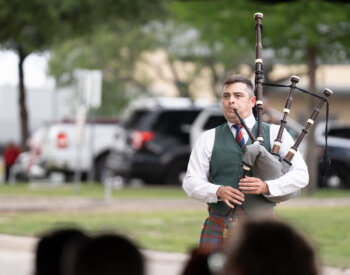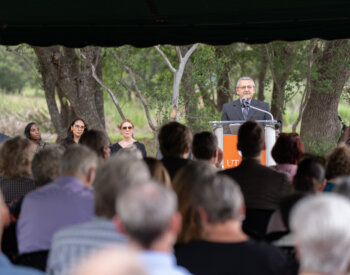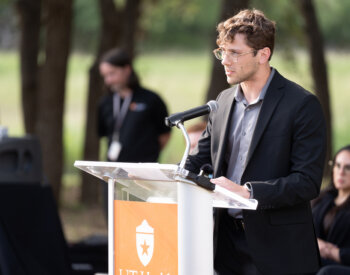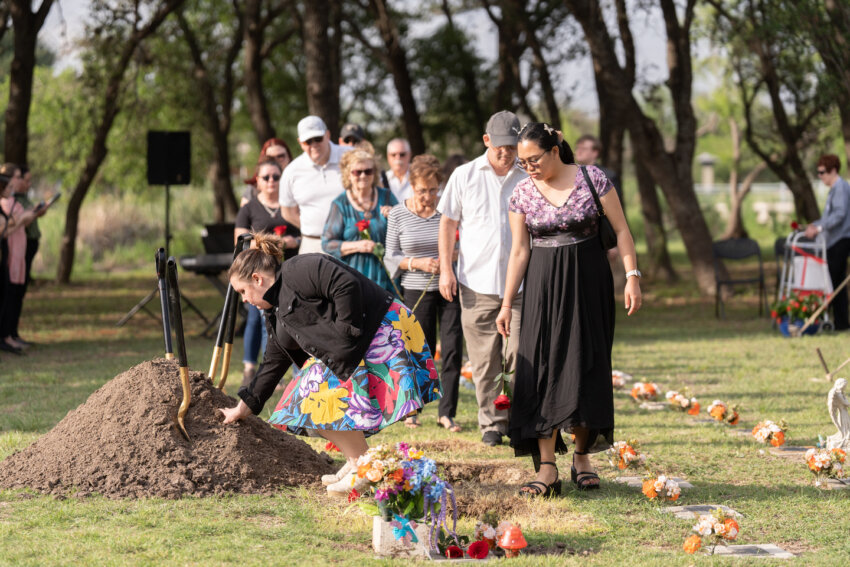SAN ANTONIO, May 4, 2023 – Beth Stewart says her mother always was one to “keep the ball rolling.”
“At any gathering, you’d want my mother to be there, because she kept the conversation going,” she said. “The reason that people loved her so much was that my mother loved people. She was interested in them. She kept the ball rolling because everybody liked to talk about themselves.”

Even in death, she acknowledges, her mother is keeping things going, as a body donor whose contribution helped educate anatomy students in various fields at UT Health San Antonio who now will take what they’ve learned and help generations of patients in their own health care practices.
Stewart was among about 150 donor family members who joined students, faculty and staff recently at the solemn yet inspirational 2023 Interment Ceremony, also called the Burial of Ashes, held at UT Health San Antonio’s Memorial Park to inter the cremated remains of donors and honor their contribution to education and research. Traditionally an annual event, this was the first one since 2019, before the COVID-19 pandemic.
“This ceremony reflects our gratitude and respect for all the participants in our body donation program, and conveys our appreciation for the compassion and support of their family and friends,” said Omid B. Rahimi, PhD, professor and director of the Human Anatomy Program of UT Health San Antonio’s Department of Cell Systems and Anatomy. “This ceremony is dedicated to those who in death have served the living through their generosity and kindness.”
His opening remarks followed a stirring bagpiper’s rendition of “Amazing Grace.” Deborah Conway, MD, vice dean of undergraduate medical education at the Long School of Medicine, expressed gratitude for the donors’ “priceless and selfless gift that they have given our students and our students’ future patients.”
From there, several students spoke, representing medical, dental, graduate school, physical and occupational therapy, and physician assistant studies programs, including a student representative from the UIW School of Osteopathic Medicine. The event concluded with a quiet procession of family members filing past gravesites marking the past three years of donations, and kneeling to place flowers or handfuls of dirt as a choir of UTSA Voice Pedagogy graduate students sang familiar hymns.
In their remarks, several students invoked an inscription posted above the entrance to the Anatomy Department that reads, in Latin, “The dead teach the living.”

“The donors were our very first patients, and they taught us so much complexity about the human body,” said Emily Tate, occupational therapy class president and a second-year doctoral student in the School of Health Professions. “But they also taught us about selflessness, service and sacrifice. These individuals were our best teachers. And they touched and taught all of us through their lives, even though they weren’t living with us.”
Others spoke of knowledge gained that they never would have gotten from a textbook. Some cited the courage of the act itself of giving for something greater than self, and without reward.
“I heard it said once that a true hero is willing to sacrifice knowing that they won’t get to see the outcome or if the day is saved in the end,” said Brian Metting, a first-year doctor of physical therapy student. “That is what these donors did. They put faith in those they didn’t know, as part of a goal they didn’t get to see the end of. And that is what we’re here to celebrate today: heroes.”
And others sought to assure family members that their loved ones were respected and cared for – and that the students respected the families for honoring and understanding the donors’ final wishes.
“I want each of you to know that we grew to care and feel a special connection with our person, in spite of the hesitancy and nervousness of our first meeting,” said Lora George, a third-year physician assistant studies student, her voice choking. “We felt reverence for their gift and took great care to treat them with respect. We also wish to thank you for your gifts to us.
“Each of you respected the wish of your loved one, even though I can only imagine how difficult that was,” she said. “Some of you gave up your chance for your own sense of closure, and the opportunity to say farewell on your own terms. Your sacrifice has not gone unnoticed. And for this, we thank you.”

Stewart’s mother died about a year ago, a few months shy of her 100th birthday. She didn’t want a funeral, and didn’t want anyone to mourn.
Standing behind the large open-tent seating area cleared of most family members who had left to queue past the gravesites at the close of the service, Stewart conceded that there will never be a time when she won’t miss her mother.
But, she would find her closure this day.
“I didn’t know how I would feel coming to this and how it would affect me,” she said, clasping a long-stem rose as she prepared to head to the gravesites herself, the choir softly serenading, “How Great Thou Art.” “But this was good for me. It was really, really good for me.”



